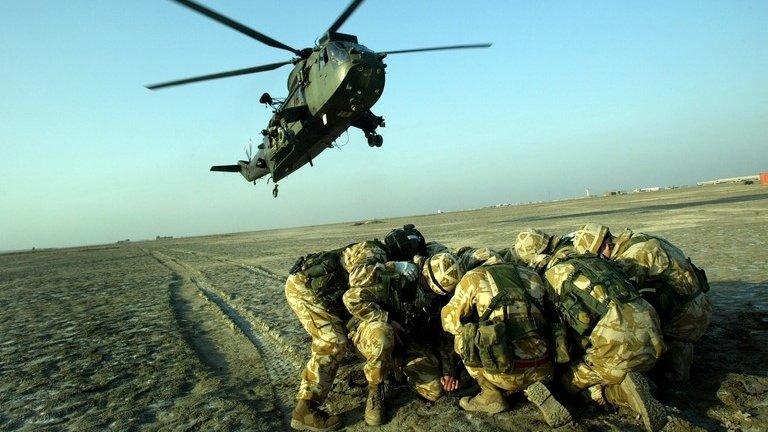Iraq War report 'delayed until after UK election'
- Published
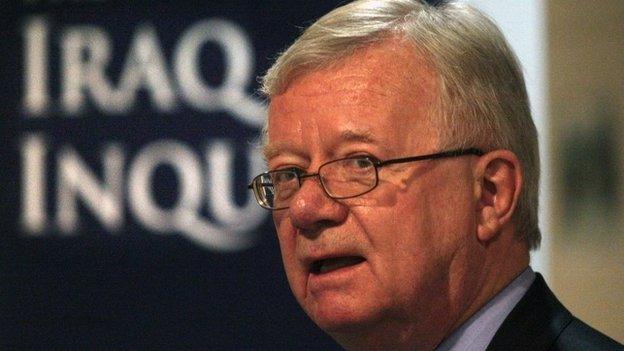
Sir John Chilcot began his work in 2009
The official inquiry into the 2003 Iraq War will not publish its long-awaited report before the general election.
BBC political editor Nick Robinson said inquiry chairman Sir John Chilcot was expected to confirm in a letter to David Cameron that it would be delayed until after the election on 7 May.
The inquiry began its work in 2009 and held its last public hearing in 2011.
Deputy Prime Minister Nick Clegg said the delay was "incomprehensible".
The Liberal Democrat leader said that the public would assume the delay was caused by those criticised in the report attempting to "sex it down".
The prime minister is to write a letter to the inquiry to "restate his frustration" at delay in publication and to say the report should have been published before the election, sources have told the BBC.
The inquiry has been looking into the reasons for the UK's involvement in the 2003 US-led invasion which toppled Saddam Hussein and the aftermath of the conflict, which saw UK troops remain in Iraq until 2009.
Right to respond
MPs have demanded that the report be published before voters go to the polls in May.
However, Nick Robinson said the process of giving witnesses time to respond to allegations against them, which began last autumn, cannot be completed in time for this to happen.
He said he expected Sir John to set out the reasons why the report could not be completed in time, a development first reported by the Guardian, external, on Wednesday.
Ministers had made it clear that the report would have to be finished by the end of February to allow enough debate on its contents before Parliament rises at the end of March ahead of the election.

Analysis
By Robin Brant, BBC News political correspondent
The prime minister will restate his frustration at the delay but it's still not clear exactly why Sir John Chilcot is yet to publish his report.
I'm told the draft report was completed last summer, after lengthy delays, as agreement was reached over revealing intelligence and the gist of discussions at the time between Tony Blair and George W Bush.
One clue as to why the process known as "Maxwellisation", where those who are going to be criticised have a right to consider that first, has taken so long is that some may not have been notified until late last year.
One former senior minister said at least one witness only got the chance to see and consider the documents relevant to them in December.
Although it's an independent inquiry, some may now push for the chairman to come before a parliamentary committee to explain why five years and more than £9m has not been enough time nor money to get it done.

Mr Cameron has spoken of his "immense frustration" at the progress of the inquiry but said that its work is independent and it would be wrong of him to intervene.
Although the inquiry has never publicly set a deadline for publication, it has been plagued by delays with lengthy wrangling over what documents can be included in the final report.
The inquiry reached an agreement last summer with the UK government in which it would be allowed to refer to the "gist" of conversations and private correspondence between former Prime Minister Tony Blair and former US President George Bush.
'Incomprehensible'
Mr Blair, one of more than 100 witnesses to have appeared before the inquiry, has insisted he is not responsible for the delays and wants the report to be made public as soon as possible.
Mr Clegg said that the country "could not wait any longer" if the findings were to be relevant to British foreign policy.
"The public have waited long enough and will find it incomprehensible that the report is not being published more rapidly than the open-ended timetable you have now set out," he said.
"We need to see a much clearer and more defined timetable, known publicly, with strict deadlines and a firm date for publication.
"If the findings are not published with a sense of immediacy, there is a real danger the public will assume the report is being 'sexed down' by individuals rebutting criticisms put to them by the inquiry, whether that is the case or not."
Critics have long accused Alastair Campbell, Mr Blair's director of communications in the run-up to the invasion, of "sexing up" a 2002 dossier outlining the threat posed by Saddam Hussein's regime, claims he vehemently rejected when giving evidence to the inquiry.

The Iraq War
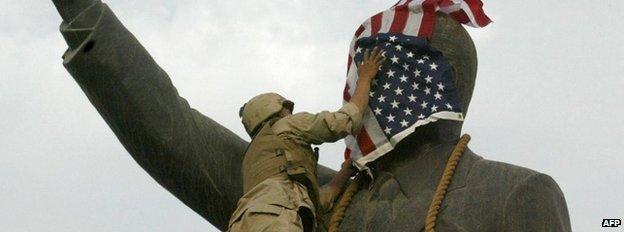
The US-led invasion of Iraq started on 19 March 2003 with a "shock-and-awe" campaign intended as a show of force
The US and the UK claimed Iraqi leader Saddam Hussein had weapons of mass destruction he was capable of using
The capital Baghdad fell in April and US President George W Bush declared "mission accomplished" weeks later
Saddam Hussein was captured, tried by the new Iraqi government and hanged. Insurgency continued
British forces ended combat operations in 2009 and the US did so the following year
A total of 179 UK service personnel and nearly 4,500 US soldiers were killed in the conflict
British-based organisation Iraq Body Count estimates 134,400 to 151,652 Iraqi civilians died since 2003, and United Nations estimates 18,805 between 2008-12 - all counts and estimates of Iraqi deaths are highly disputed
The Chilcot inquiry into the UK's role in the war was established by Prime Minister Gordon Brown in 2009

According to BBC assistant political editor Norman Smith, the former attorney general Dominic Grieve believes it should have been possible to publish the Chilcot report before Christmas.
Mr Grieve said he understood the report was completed by the middle of last year.
Conservative MP Bernard Jenkin said Cabinet Secretary Sir Jeremy Heywood will be questioned about the inquiry when he appears before MPs on the Public Administration Select Committee next week.
"I think we all thought this was coming," Mr Jenkin said. "It just had that smell about it, didn't it? I think we deserve an explanation."
While a serious matter, Mr Jenkin said he did not believe the delay was an "election issue".
"Some people are very exercised about it," he said. "It is the third inquiry on an Iraq-related matter. I'm more anxious that lessons are learned from that conflict, from the Afghan conflict as much as anything else."
Sir Jeremy, who has the final say over the declassification of documents relating to the war, said last year that the final report would tell the "whole story" about the UK's involvement.
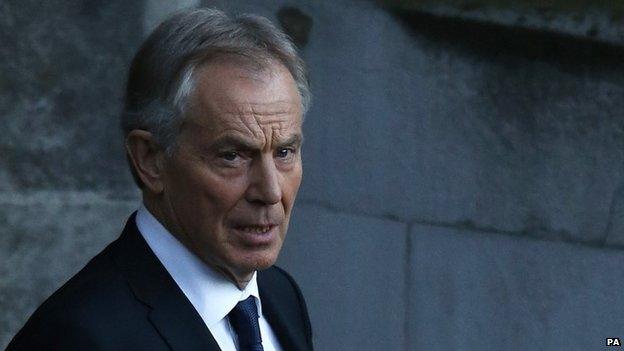
Tony Blair was one of more than 100 witnesses at the inquiry
A Labour spokesman said: "Labour established the Chilcot inquiry because it is crucial we learn the lessons of Iraq.
"While the timing is a formal matter for Sir John Chilcot we have always said the inquiry should report as soon as practically possible."
Former Lib Dem Home Office minister Norman Baker said a backbench debate on the inquiry will still go ahead on Thursday next week.
The motion - sponsored by Mr Baker, David Davis, Fabian Hamilton and Caroline Lucas - calls for the inquiry to publish its findings by 12 February.
Mr Baker said: "It is deeply concerning that John Chilcot has apparently decided he cannot published his report before the election.
"The British people are entitled to know what was done in their name before 7 May. The debate in a week's time must continue and in many ways becomes even more important."
- Published21 January 2015
- Published5 July 2016
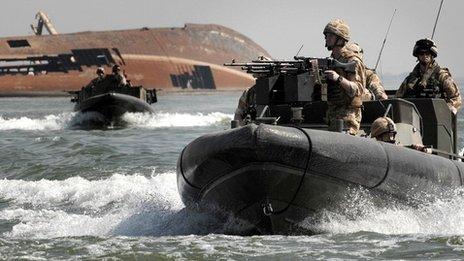
- Published29 May 2014
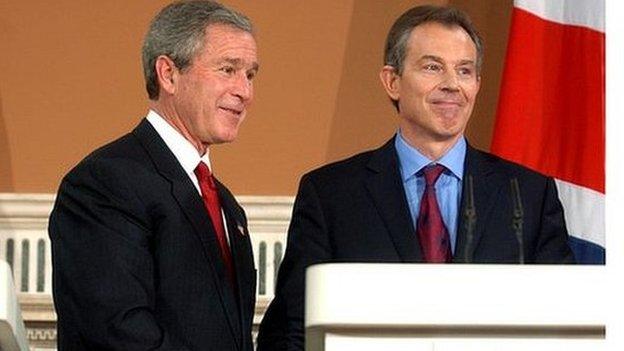
- Published27 May 2014
